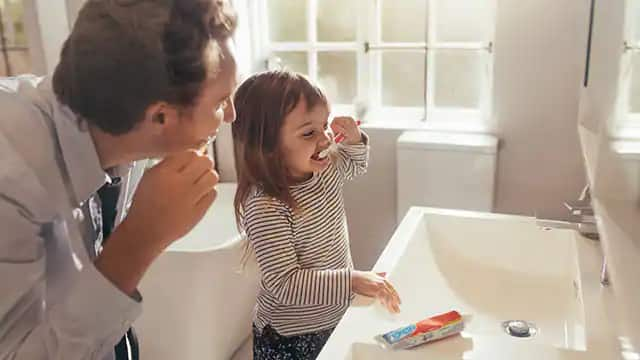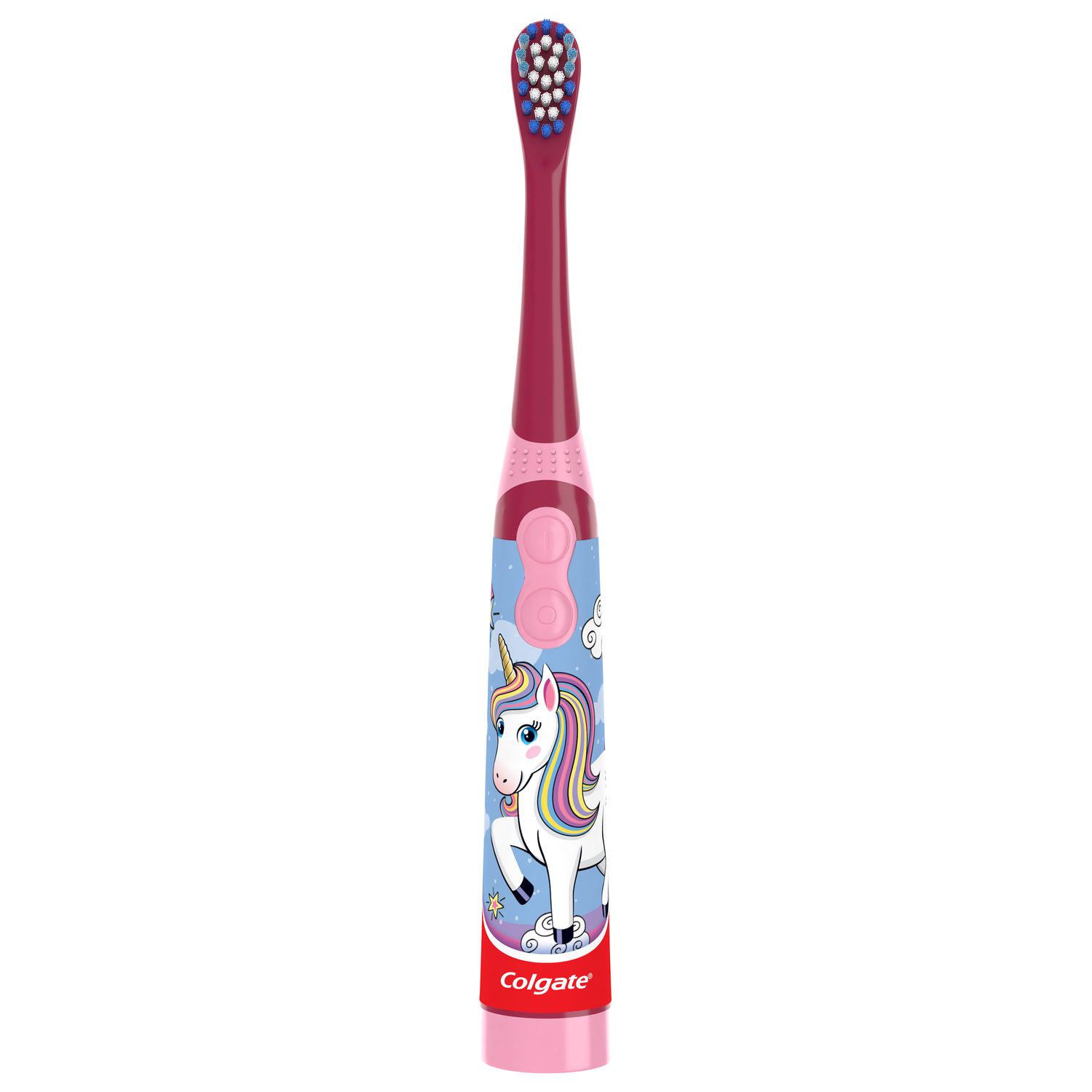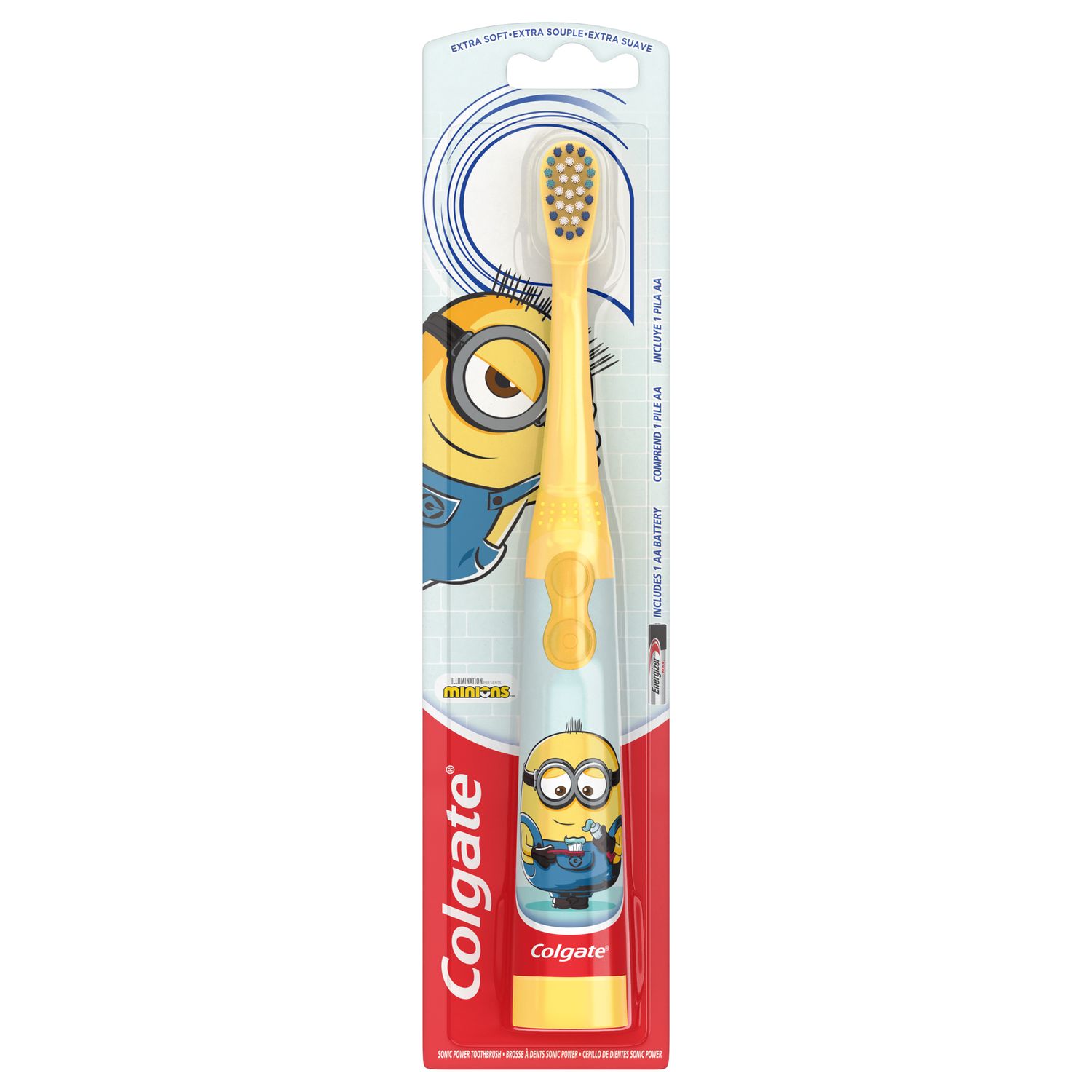5 Tips for Children’s Dental Health
Oral hygiene practices for children are similar to your own adult oral care routine. To help your children protect their teeth and gums and significantly reduce their risk of getting cavities, teach them to follow these steps:
- Teach your child to clean their teeth at least twice a day.
- Provide them with a well-balanced diet that limits starchy or sugary foods.
- Make sure that your child is drinking water or using dental products with the appropriate level of fluoride.
- Take your child to the dentist for regular check-ups and preventive care.
- Visit the dentist right away if an injury has led to chipped, broken, or knocked-out teeth.
Now you know the basics of children’s dental health, here’s how to put them into practice…
How Do I Get My Child Excited About Brushing Their Teeth?
You might find that your child is a reluctant brusher, which can make practicing a regular oral hygiene routine something of a battle. The good news? It's easy to make brushing fun for kids; all you need is a little creativity. Try:
- Making oral care group activity. Seeing siblings enjoying their routine can set a good example and make other kids want to be part of the action.
- Adding some entertainment. Play their favorite song or encourage your child to make up their own. You can also try reading a two-minute story in a funny voice or playing a short story or podcast.
- Using rewards. Reward systems can help kids to make cleaning their teeth a habit. Try giving them a sticker on a reward chart each time they clean their teeth.
- Getting them involved. Try to involve your children as much as possible so that they feel excited and empowered about keeping their teeth and gums healthy. For example, you might try letting them pick out their own toothbrush.
When Should My Child Begin Flossing?
Cleaning between your teeth with floss, flossers, or water flossers removes food particles and plaque that brushing misses. You should introduce flossing as soon as your child has two teeth that touch, which will usually happen between 8-12 months of age. Check out these five simple steps to flawless flossing.
How do I Prevent Early Childhood Cavities?
To prevent early childhood cavities, take your child for regular dental check-ups, practice excellent oral hygiene, and carefully control the sugar in their diet.
Your child should have their first visit to their dentist when their first tooth erupts, or by their first birthday, whichever comes first. The dental hygienist can examine your baby's mouth for decay or abnormalities, and detect any problems early on. Additionally, they can advise you on good oral habits for your child to reduce oral bacteria in the mouth.
Your dentist or hygienist will also explain that free sugars, like those found in juice and candies, are linked to tooth decay and cavities. Specifically, they’ll give you advice on preventing baby bottle tooth decay. Also called early childhood dental caries, this is one of the most important infant tooth care issues. This condition occurs when the baby regularly sips on milk, formula, or juice from a bottle or sippy cup for an extended period of time, e.g. overnight. The sugars pool inside the mouth and can lead to cavities in both the top and bottom teeth.
To avoid baby bottle tooth decay, never let a child fall asleep with a bottle in their mouth and limit nursing as they sleep. If your baby needs something to suck on to fall asleep, offer a bottle filled with water or a pacifier.
Consider taking your children to a pediatric dentist who understands how to make dental check-ups less intimidating. Pediatric dental offices often have toys, games, and movies to help children relax and enjoy going to the dentist.
Are Dental Sealants Effective Protection Against Cavities?
Absolutely! According to the American Dental Association (ADA), sealants have been shown to prevent dental caries (cavities) by sealing small fissures in the enamel. Dental sealants act as a highly effective barrier against decay. Applying sealants is painless and can be performed in one dental visit. Ask your dentist about the benefits of sealants for your child's teeth.
What Is Fluoride and Is My Child Getting Enough?
Fluoride is a naturally occurring mineral and is used in most oral care products like toothpaste to strengthen tooth enamel and prevent tooth decay. In many municipal water supplies, a safe and effective amount of fluoride is added to support proper tooth development and prevent tooth decay. If your water supply does not contain fluoride, ask your dentist or pediatrician whether your child may benefit from a fluoride supplement.
How Important Is Diet to My Children’s Dental Health?
A balanced diet is critical for your child to develop strong, healthy teeth. However, this doesn't mean it's time to ban their favorite snacks and treats! When they enjoy these foods, serve them as part of their meal instead of as snacks alone. The extra saliva produced during meals helps rinse the acid-creating sugar and starches from the mouth.
A child's diet should include a full range of vitamins and minerals and proper levels of fluoride. Foods rich in calcium, phosphorus and protein, such as dairy products and lean meats, play an essential role in protecting and rebuilding your tooth enamel.
You should avoid letting your child consume large amounts of candy, soft drinks, cookies, or other sugary food and drinks that can lead to tooth decay. If your family regularly consumes sugary foods and soft drinks, start cutting back on some of these items and replacing them with healthier options, like fresh fruit and water.
What Do I Do if My Child Chips, Breaks, or Knocks Out a Tooth?
Accidents happen, but you should immediately contact your dentist when an injury has occurred to your child's mouth, such as a broken, cracked, or chipped tooth. They can determine the appropriate treatment. If possible, keep any part of the tooth that has broken off and take this with you to the dentist.
If a tooth is entirely out of the mouth due to an injury, keep it moist and take the tooth to your dentist right away if possible. Handle the tooth as little as possible — do not wipe or otherwise clean the tooth. Store the tooth in milk, or use a tooth preservation product until you get to a dentist. It may be possible for the tooth to be placed back into your child's mouth.
Excellent dental health for kids starts with setting a good example. Remember, anything that makes taking care of teeth fun, like brushing along with your child or letting them choose their own toothbrush, encourages proper oral care. Start teaching these habits early, so you can help set your child up with a bright, healthy smile for their whole life.
Frequently Asked Questions About Children’s Dental Health
How often should my child visit the dentist for check-ups?
Take your child to the dentist for a check-up every six months, starting from when they get their first tooth.
How can I help my child overcome fear of the dentist?
The earlier you take your child for their first dental visit, the less likely they will be to develop a fear of the dentist. You can help to make dental visits a positive experience by letting them know what to expect ahead of time, perhaps by using stories or online videos. You can also lead by example by showing a positive attitude towards your own dental care and sharing reassuring stories with your child. If your child is truly terrified of the dentist, try visiting a pediatric dentist. They deal with anxious children every day, so they’ll have tried-and-tested strategies to help your child to overcome their fears.
What should I do if my child has a toothache?
Book in with your dentist right away. A toothache could be a sign of a problem that needs to be treated, like cavities or an infection. The sooner these issues are dealt with, the happier the outcome for your child.
What are some common dental problems seen in children, and how can they be prevented?
The most common dental problem in children is tooth decay. You can prevent this by limiting sugar in their diet, practicing excellent oral hygiene with them, and taking them for regular dental check-ups every six months.
What should I do if my child chips, breaks, or knocks out a tooth?
Contact your dentist immediately. Handle any part of the tooth that has fallen out as little as possible, preserve it in milk, and take it with you to the dentist.
Oral Care Center articles are reviewed by an oral health medical professional. This information is for educational purposes only. This content is not intended to be a substitute for professional medical advice, diagnosis or treatment. Always seek the advice of your dentist, physician or other qualified healthcare provider.
ORAL HEALTH QUIZ
What's behind your smile?
Take our Oral Health assessment to get the most from your oral care routine
ORAL HEALTH QUIZ
What's behind your smile?
Take our Oral Health assessment to get the most from your oral care routine















